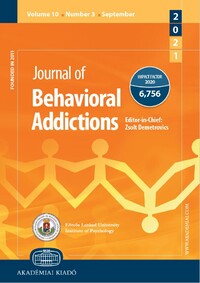The effect of gambling problems on the subjective wellbeing of gamblers’ family and friends: Evidence from large-scale population research in Australia and Canada
The effect of gambling problems on the subjective wellbeing of gamblers’ family and friends: Evidence from large-scale population research in Australia and Canada
Author(s): Catherine Tulloch, Nerilee Hing, Matthew Browne, Matthew J. Rockloff, Margo HilbrechtSubject(s): Behaviorism
Published by: Akadémiai Kiadó
Keywords: problem gambling; concerned significant others; gambling harms; subjective wellbeing; HILDA; Quinte Longitudinal Study
Summary/Abstract: Background and Aims. Excessive time and money spent on gambling can result in harms, not only to people experiencing a gambling problem but also to their close family and friends (“concerned significant others”; CSOs). The current study aimed to explore whether, and to what extent, CSOs experience decrements to their wellbeing due to another person’s gambling. Methods. We analysed data from The Household Income and Labour Dynamics in Australia Survey (HILDA; N = 19,064) and the Canadian Quinte Longitudinal Study (QLS; N = 3,904). Participants either self-identified as CSOs (QLS) or were identified by living in a household with a person classified in the problem gambling category by the PGSI (HILDA). Subjective well-being was measured using the Personal Wellbeing Index and single-item questions on happiness and satisfaction with life. Results. CSOs reported lower subjective wellbeing than non-CSOs across both countries and on all three wellbeing measures. CSO status remained a significant predictor of lower wellbeing after controlling for demographic and socio-economic factors, and own-gambling problems. There were no significant differences across various relationships to the gambler, by gender, or between household and non-household CSOs. Discussion and Conclusions. Gambling-related harms experienced by CSOs was reliably associated with a decrease in wellbeing. This decrement to CSO’s wellbeing was not as strong as that experienced by the person with the first-order gambling problem. Nevertheless, wellbeing decrements to CSOs are not limited to those living with a person with gambling problems in the household and thus affect many people.
Journal: Journal of Behavioral Addictions
- Issue Year: 10/2021
- Issue No: 4
- Page Range: 941-952
- Page Count: 12
- Language: English

